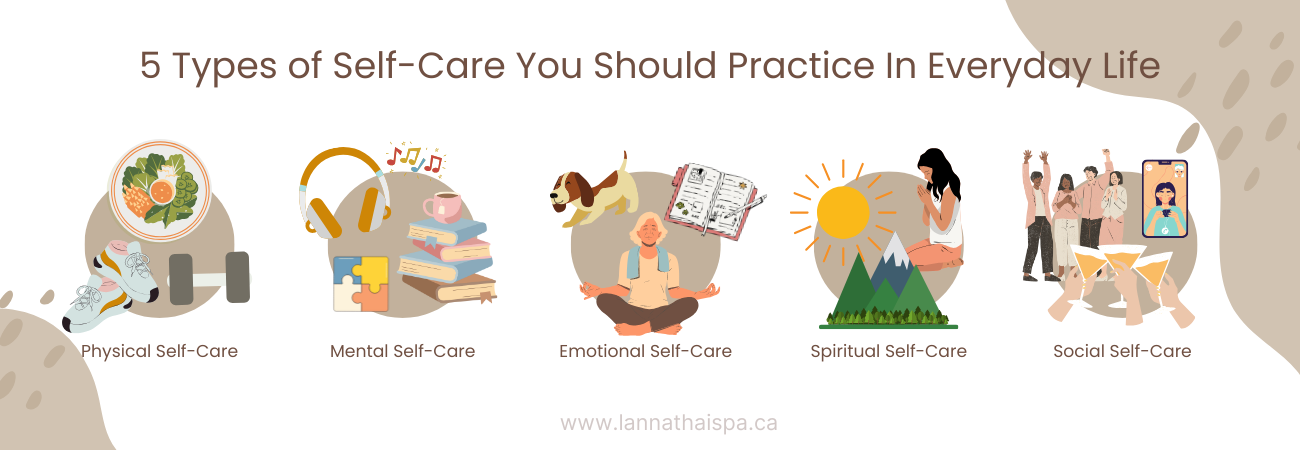Photo Credits to kimgalloesthetics.com
Did you know that there are different types of self-care? Many people automatically think of relaxing when they hear the term self-care, but it’s actually more than that. While it’s true that self-care includes activities like relaxing and pampering yourself, it also encompasses physical, mental, emotional, spiritual, spiritual, and even spiritual care.
Each type of self-care plays a crucial role in maintaining overall well-being, ensuring that you’re not just managing stress, but also nurturing all aspects of your life. By understanding and practicing these different forms of self-care, you can create a more balanced and fulfilling lifestyle.
Let’s explore the various areas of self-care so you can start implementing these into your everyday life!
The Importance of Self-Care
But before we get into that, let’s quickly discuss why self-care is important. Self-care entails different activities that support the different aspects of your health like physical, mental, and emotional health, among others. It’s a conscious act that you should take to help restore balance and promote your overall health and well-being.
These wellness activities vary from person to person, since we all have different needs. It could be as simple as stepping outside for a few minutes to get some fresh air or as grand as taking a week-long vacation on a tropical island, if that’s what you need. You can gain so much from taking care of your mind, body, and spirit. These include stress and anxiety relief, burnout prevention, increased energy, improved interpersonal relationships, and more.
Types of Self-Care To Practice For Overall Wellbeing
To achieve overall well-being, it’s important to practice self-care in different aspects of your life. From being physically active to having peace of mind, make sure that you cover the different types of self-care below.

Physical Self-Care
Have you ever heard of the expression “a sound mind in a sound body”? This cannot be more true because there’s a strong connection between your mind and body. If your body is in poor health, so will your mind, and vice versa.
Physical self-care will be different for everyone, but eating healthy, getting sufficient sleep, and regular exercise are the best foundation. It’s important to assess your needs and identify your goals when it comes to your own physical self-care. Do you need to start a daily exercise routine? Do you need regular massage sessions to soothe your tired muscles? Do you want to try a new sport? Knowing what your body needs will allow you to practice proper care.
Mental Self-Care
If you’re taking care of your body, you should be proactive at taking care of your mind, too. Apart from taking a mental break, it’s also important to stimulate your mind and improve brain functionality.
Relax your mind by doing a digital detox, watching feel-good movies, or listening to calming music. Keep your mind sharp by reading books, listening to podcasts that interest you, or doing brain teasers or puzzles. These activities can help get you out of a mental rut and at the same time increase your energy and change your outlook in life.
Emotional Self-Care
Knowing how to properly process your emotions is also an important part of self-care. When negative emotions spiral out of control, it can affect your personal relationships and overall well-being. It’s important to work on your coping skills so that you are able to acknowledge and express your feelings regularly and safely.
Practices such as gratitude journaling, meditation, talking to a friend, or seeking therapy are just a few emotional self-care activities that can help.
Spiritual Self-Care
Research says that a lifestyle that includes religion or spirituality is generally healthier. However, not everyone is religious. But that doesn’t mean they can’t practice spiritual self-care, which takes on many forms.
Nurturing the spirit doesn’t have to involve religion. Caring for your spirituality can mean anything that can help you connect with the universe more and develop a deeper sense of meaning. Practice spiritual self-care activities that will better you personally – whether it’s prayer, breathwork, yoga, meditation, time in nature, community service, or attending a spiritual retreat or religious service, find out what works for you to keep your spirituality intact.
Social Self-Care
We are naturally social creatures thus the saying “no man is an island”. The Centers for Disease Control and Prevention (CDC) says that social isolation is a major contributor to loneliness and associated with higher rates of depression and suicide.
For many of us, our personal relationships with family and friends are a nourishing source of mental and emotional health. However, for some, it can also be the source of stress. It’s important to navigate your needs and identify your own social needs. Building a strong support system, catching up with friends regularly, setting healthy boundaries, asking for others’ help when needed, and limiting time with negative people are a few ways to effectively practice social self-care.
In Conclusion
Knowing the different types of self-care and nourishing each one will help make sure that you thrive in various aspects of your life. This way, you’ll feel healthier, happier, and more in love with life!



